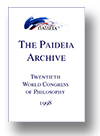|
21.
|
The Paideia Archive: Twentieth World Congress of Philosophy:
Volume >
10
Loretta Torrago
Vagueness and Identity
abstract |
view |
rights & permissions
| cited by
The view that identity can be vague holds that there are statements of identity which are neither true nor false. The view that composition can be vague holds that unities can have borderline constituents — that is, elements that are neither parts nor non-parts of some larger unity. The case for vague identity is typically made by way of an argument for the vagueness of composition. In this paper, however, I argue that the thesis that composition can be vague is actually incompatible with the thesis of vague identity. The argument for the incompatibility of these two views arises out of a demonstration of the way in which constituency facts (even vague constituency facts) are grounded in the other facts about how a larger unity is configured. Thus, I show that composites that are allegedly vaguely identical are actually different configurations. Hence, the alliance of vague composition with vague identity is taken to be all that is needed in order to show that compositional vagueness is indefensible.
|
|
|
22.
|
The Paideia Archive: Twentieth World Congress of Philosophy:
Volume >
10
Robert E. Tully
Tractarian Dualism
abstract |
view |
rights & permissions
| cited by
While Wittgenstein’s Tractatus keeps issues of metaphysics and ontology at arm’s length, the world it presents seems altogether monistic in character. In Wittgenstein’s account, it is a world of objects and facts, a world which lacks selves, values, cognitive relations (such as belief), and God. I argue that the Tractarian world is nevertheless dualistic. I defend the view that the Tractatus points away from monism towards dualism and that Wittgenstein’s concepts of thought, sense, and understanding are an essential part of its structure. The language Wittgenstein uses was necessitated by his project of giving a sharp account of the nature of description. It is thus ironic that Wittgenstein defends dualism in the Tractatus and does so in the only form in which he thought it could be defended. Along the way, I try to show that his treatment of thought, sense, and understanding is both a continuation and correction of treatments which Frege and Russell had previously given to these concepts.
|
|
|
23.
|
The Paideia Archive: Twentieth World Congress of Philosophy:
Volume >
10
Igor I. Yevlampiev
Metaphysical Premises And Types Of Liberal Ideology:
Liberalism As The End And Liberalism As The Way
abstract |
view |
rights & permissions
| cited by
The problem of choosing the way for our country unavoidably brings us to a discussion of the problem of liberalism. At first glance, this should not be a problem since liberal principles underlie Western society and are the basis of the modern world order. But this opinion is not shared by all intellectuals in Russia. First is the specificity of the Russian mentality, social consciousness and social life. The idea of 'Russia's own way' is much referred to by various political movements of pronounced nationalist color, but we have to study this idea at its deepest level rather than oversimplify reality. Yet even most thinkers who are oriented to the West and have insisted on the adoption of Western values and standards have also strongly criticized European civilization. Secondly, liberalism does not have a simple meaning. It connotes a number of complex ideological systems transformed over time both in theory and in political practice. Therefore, it is important to analyze the metaphysical premises of liberal doctrines and systems. I will examine assessments of liberal ideas made by Russian religious philosophers in the late 19th and early 20th centuries such as P. Struve, N. Novgorodtsev, I. Iliin, and S. Frank who all considered liberalism primarily a metaphysical rather than a legal or political phenomenon, and interpreted it as an empirical manifestation of the deep nature of the human spiritual reality.
|
|
|
24.
|
The Paideia Archive: Twentieth World Congress of Philosophy:
Volume >
10
Mark Vasilyevich Zhelnov
Paideia of “Nihil of Reliabilty of Existing” and Paideia of “Nihil of Truth of Being”
abstract |
view |
rights & permissions
| cited by
This paper traces the transformation of the idea of Paideia as an intellectual mode of existence and being in Antiquity, the Middle Ages, the Renaissance, and the modern period to the idea of Paideia as an intellectual mode of the nihil that is oriented toward the future. It comments specifically on the ideas of Leibniz and Heidegger which have contributed to this development.
|
|




